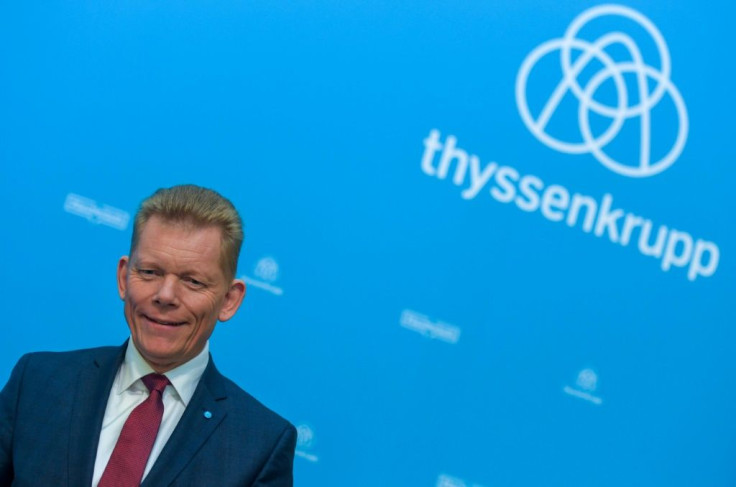Thyssenkrupp Seeks New CEO Amid German Boardroom Malaise

German industrial giant Thyssenkrupp sank into fresh turmoil as it announced plans late Tuesday to fire chief executive Guido Kerkhoff, in a new episode of the drama plagueing boardrooms of "corporate dinosaurs".
The chaos on Thyssen's executive floor underlined the hefty challenge faced by the conglomerate, which has grown over more than two centuries into a behemoth making products from raw steel to submarines and car parts, to slim down and refocus.
Kerkhoff, who had only been in the job for 14 months, had been tasked with splitting the company in two, finding an alternative after a planned merger with India's Tata collapsed, and floating the highly-profitable elevators division, estimated to be worth around 15 billion euros ($16.6 billion).
But all the plans to trim the increasingly unwieldy outfit now stand incomplete.
Kerkhoff had stepped up as Thyssen's CEO after after his predecessor Heinrich Hiesinger quit in July 2018, following months of backseat driving from activist investors like US-based Elliott and Sweden's Cevian.
Then-supervisory board chairman Ulrich Lehner soon followed, complaining of "psychological terrorism" from shareholders of the manufacturer which for years has suffered from cut-price competition from Chinese steelmakers.
Its plans to slim down its complex structure by merging that arm of its steel operations with Indian firm Tata were frustrated earlier this year by the European Commission's competition watchdogs.
That in turn collapsed a scheme to split the company into two separate halves, "Materials" and Industrials".
Meanwhile, the flagging car industry and trade wars have undermined the broader German economy, eating into Thyssenkrupp's performance.
Now the supervisory board's personnel committee has suggested Kerkhoff should go, to be replaced by present supervisory board head Martina Merz for up to a year.
While it is still making profits, Thyssenkrupp last November reported its earnings have slumped in its 2017-18 financial year to just 60 million euros, down 78 percent on 2016-17.
A day after the latest management chaos erupted, the company's shares were trading at just 12.35 euros around 1 pm on Wednesday (1100 GMT), down from above 26 euros in early 2018.
It has also lost its blue-chip status as a member of the DAX index of leading German stocks.
With its 18-percent stake, Cevian expects "that the new leadership will speed up the transformation process that Thyssenkrupp so urgently needs," founding partner Lars Forberg said in a statement.
Forberg urged a "crystal-clear strategy and a well-defined plan of action."
Dying-out of 'dinosaurs'
But across Germany's corporate landscape, Thyssen is not alone in its travails.
Several other massive German groups have also in recent years embarked on such reorganisation exercises -- mainly spinning off business units and refocusing around "core" activities.
If size was an advantage "the whole world today would be full of dinosaurs," Siemens chief executive Joe Kaeser told investors earlier this year.
"Something must have been wrong with them, because, obviously, they don't exist," he added.
In recent years, Siemens has trimmed sail with moves like spinning off lightbulb division Osram and floating its Healthineers medical devices unit, a step also planned for its energy arm next year.
But even Kaeser appears on the way out, as supervisors have named Roland Busch deputy CEO -- a clear heir apparent.
Slimming-down processes don't always run smoothly.
Bosses at once-sprawling chemical and pharma giant Bayer faced an unprecedented rebuke from shareholders at their annual general meeting this year, as they voted against signing off on the board's 2018 actions.
Investors were angered by billions in legal risks resulting from the group's takeover of US seeds and pesticides firm Monsanto -- part of Bayer's years-long transition to a "life sciences" firm focused on pharmaceuticals, agrichemicals and over-the-counter medicines.
Even car industry behemoths are inching towards streamlining.
VW part-floated its Traton heavy trucks division earlier this year, while Daimler is restructuring into three more independent divisions covering cars and vans, trucks and buses and financial and technology services.
But restructurings often chew through the bosses who drive them forward.
With Christian Sewing, the country's biggest lender Deutsche Bank is on its fourth chief executive (including one pair in Anshu Jain and Juergen Fitschen) since the financial crisis.
None has so far succeeded in righting the struggling ship, and Sewing's plans for deep cuts in investment banking and a new focus on the German and European markets have yet to convince investors and observers.
© Copyright AFP 2024. All rights reserved.




















